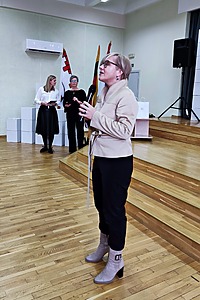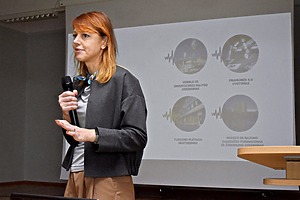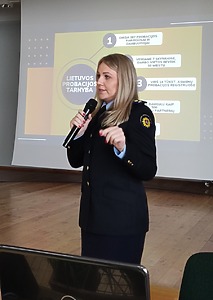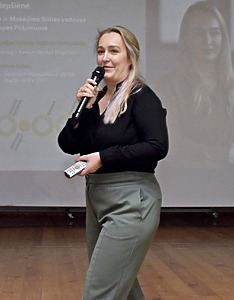On November 24, the 23rd student scientific conference “Technology and Business Trends – 2023” took place at the Panevėžys Faculty of Technology and Business (PTVF) at Kaunas University of Technology (KTU). The conference traditionally included a plenary session with business representatives and working sessions with student presentations.

During the opening of the conference, the dean of KTU PTVF, Prof. Daiva Žostautienė, expressed her delight at seeing a large gathering of young faces who would present their research results at the conference. “I believe that thanks to this conference, you will certainly rise: by sharing your knowledge, communicating, collaborating, and developing your oratory skills. And that’s why you are here – to grow yourselves and help us grow together. By creating good for yourselves, you will create good for others. Thank you for sharing your insights and knowledge,” said Dean D. Žostautienė.
Presentations by Business Representatives at the Plenary Session
During the plenary session, representatives from four institutions participated and presented. Rasa Bielskytė, project manager at Doresta, delivered a presentation titled “Behavioral Economics: A Push into the Future,” and admired the closeness of the PTVF community, stating that she was motivated to come and present at lectures or other events.

Jūratė Raukštienė, chief project manager of the business environment at the Panevėžys Development Agency “PanevėžysNow,” shared insights about the city’s business environment and other current issues.

Ieva Repšienė, head of the purchasing and payment sector at the SEB group, presented on the topic “Fifteen Years in One Organization. Why?” and Karolina Banevičiūtė, a senior specialist at the Lithuanian Probation Service who attended the conference, discussed the importance of the service in integrating offenders into the labor market.
Students’ Insights and Experiences in Presentation Sessions
The 23rd conference invited master’s and bachelor’s degree students to present their articles. The presentations were held in sections “Management 1,” “Management 2,” “Finance, Marketing, Social Responsibility,” and “Construction Engineering / Electronics Engineering.” Students discussed the latest trends in technological sciences, presented the results of experiments, analyzed the most relevant social, business, and economic issues of today. A total of 44 presentations were made at the conference.
Jolita Šinkūnė, a Master’s student in Management who attended the plenary session, emphasized two presentations that she foundespacially attractive. It was R. Bielskytė’s presentation on marketing and consumer behavior, which she personally found very useful, and a presentation by I. Repšienė, in which she told about her own situation related to managerial work, challenges in employee motivation and practical solutions she plans to implement.
Master’s student Vilma Šidlauskienė stated that the information from the plenary session was interesting, useful, and the presenters warmly interacted with the audience, providing relevant material that expanded her horizons. She highlighted the presentation by J. Raukštienė from “PanevėžysNow.” “It was nice to learn more about the city of Panevėžys and hear about how cities are promoted, what events and ratings they participate in ,” the student revealed.

Justina Vorobjova, a student in the extended master’s program, singled out Ieva Repšienė’s presentation as the most resonant with her. She admired the charisma and relaxed demeanor of the head of the purchasing and payment sector. Justina also appreciated the work of her fellow students. She particularly enjoyed the presentation “Leadership for Learning and Its Projection in Preschool Educational Institutions” presented by R. Breimelienė. “I liked this presentation because the presenter was very relaxed, did not feel any stress, the slides were clear and concise, and the presentation was well-structured,” said J. Vorobjova.
Master’s student Jurgita Ablėnė noted that all the presenters at the plenary session impressed her in various ways. The presentations sparked her interest in exploring the city where she lives, what brings pleasure to work, and conversely, why one might not want to go there. It was also useful for her as an employer to learn about probationers seeking employment.
Jurgita herself presented a paper on “Conditions for the Expression of Shared Leadership in Environmental Educational Institutions.” “I chose this topic because I work as a leader in an environmental preschool, and I was curious to explore how shared leadership can contribute to environmental protection. As a result of the research, I gained a lot of valuable information which I will directly apply in my institution,” J. Ablėnė was delighted with the results of her work.
Master’s student Domas Jankevičius, who presented on “The Bearing Capacity of Pile Foundations Dependent on Soil Type,” admitted that he was very nervous but was proud of his colleagues who found it easier. “It was good to see the mistakes in other presentations and reflect on what I was doing similarly and how to avoid that. I can learn from the excellently presented works, as they serve as excellent examples for my future,” D. Jankevičius shared.
The students who presented their papers stated that although they felt anxious, everything went well during the process. They unanimously agreed that it was a great opportunity to test themselves.